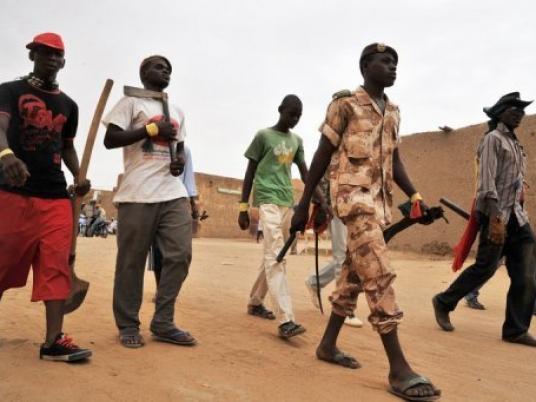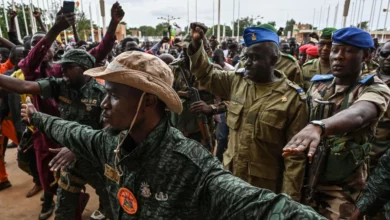
Residents of Gao, one of the three main towns in northern Mali occupied by armed Islamists since late March, are fighting back against radicals who brutally apply strict sharia law.
The stoning to death of an unwed couple, the amputation of the hand of a thief, whippings for "illegitimate" couples and people who smoke cigarettes and drink alcohol have been among the harsh punishments meted out by the Islamists, who claim ties with Al-Qaeda in the Islamic Maghreb (AQIM).
In Gao, near the border with Niger, hundreds of residents, mainly youths, have taken their lives in their hands several times since May to oppose hardline tactics, initially because they were banned from watching television and playing football.
One week ago, people again took to the streets in a successful protest to stop the Islamists cutting the hand off a thief, then to protect a radio show host from being beaten up for reporting the first demonstrations against the amputation.
"At this rate, the people are going to chase out the Islamists with their bare hands," said Soumaila Kante, a young sociologist in Gao.
But three days later, it was at Ansongo, a nearby town, that for the first time since the occupation of northern Mali, the amputation of the hand of a thief took place in public.
A local leader of the Movement for Oneness and Jihad in West Africa (MUJAO), which is one of the two groups linked to AQIM, with Ansar Dine (Defenders of Islam), vowed to act soon in Gao itself.
At first, the MUJAO fighters were well regarded in Gao, because they were opposed to Tuareg rebels of the National Movement for the Liberation of the Azawad (MNLA), which was accused of many cases of violence and theft in the town, before being chased out by MUJAO on June 27 after heavy fighting.
"At the start, people really appreciated the Islamists because they respected us, contrary to the Tuareg rebels who were better known for brigandry than anything else," a nurse at Gao hospital said, before adding, "But you must never forget that here, people are stubborn and courageous."
"There's no love lost" between the Islamists and the population now, said Abdoul Karim Maiga of the Collective of Inhabitants of the North of Mali (COREN). "With their sharia, (which imposes) cutting off hands, banning smoking, beating people, the esteem shown to the Islamists fell fast."
Tiegoum Boubeye Maiga, a Malian journalist who comes from the Gao region, told AFP that the town has always been "restless." "I'm not surprised that it's taken the lead in challenging the Islamists, because there are limits that should not be crossed."
He added that "in northern Mali, it's always been Gao that takes the leads in revolts, before they spread. It was Soni Ali Ber, first emperor of Gao (1464-1493) who freed Timbuktu from the yoke of the Tuaregs."
The bravura of Gao's residents has set a trend for action in other parts of the north, notably at Goudam, south of Timbuktu, where to show their disapproval of the behavior of the Islamists, inhabitants burned part of a building they were occupying, then prevented them from praying in a local mosque.
The Islamists made a great effort to hand out gifts when the holy fasting month of Ramadan arrived, but their strict application of sharia is hard to stomach for the local people.
The populations of the three main occupied towns — Gao, Timbuktu and Kidal — are currently trying to form a "coalition of indigenous people of the north" against those they see as "the invaders."
"We resisted the Tuaregs, we're going to resist the Islamists by all possible means, if they blindly want to enforce the full rigor of the sharia among us," said a former senior administrative official in Goudam who asked not to be named and who added, "Ours is a land of Islam, not for Islamists."




